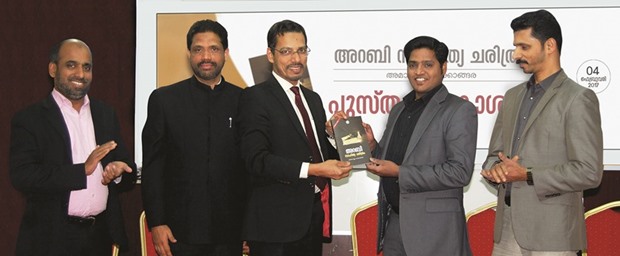Languages are hereditary assets of human civilisations and all efforts are to be made to master as many languages as possible. With these words, C A Razak, an international mind power trainer and success coach, summed up the importance of an interesting new book that was recently launched.
Releasing the revised edition of The Literary History of the Arabic Language, written by Amanulla Vadakkangara, Doha-based Indian author and CEO of Mediaplus, a local advertising and event management company, at a function held at Friends Cultural Centre, Razak observed that language is more than just a means of communication. It influences our culture and even our thought processes, he pointed out. The more languages we learn, the more enlightened and broad-minded we become.
“There is a unique tie between culture and language. The languages we speak provide us with the words and concepts to describe the world around us, allowing us to verbalise certain values easily. Anything we as a cultural group value will surely have a known and easily understandable term,” said Razak.
Words can have deep meanings, and finding the right word for the right context can be an interesting and formidable challenge, he pointed out. “The relationship between language and culture is deeply rooted. Language is used to maintain and convey culture and cultural ties. Arabic is one of the world’s great languages. Its graceful script, magnificent style and rich vocabulary give the language a unique character and flavour. The importance of Arabic language and its rich literal history are highly relevant to all those who live in the Gulf countries,” he said.
At the ceremony, Razak handed the first copy of the book, which is in Malayalam, over to John Prince Idicula, Managing Director of Class International Company. Mashood Thiruthiyad, the President of Chaliyar Doha, spoke on the occasion and shared his experience of using the first edition of the book for his pre-degree examinations in 1989. The book has been a reference source for thousands of students for the past 29 years and its revised and updated version is all the more comprehensive and student-friendly. Having been reprinted every year, it still continues to be the sole source of reference to many students who opt for Arabic in their degree courses. Vadakkangara explained that this was the first book he published.
Vadakkangara told Community, “This book is important to me in several ways. This was my first book I published when I was a second year BA student. The book was published by the teacher and the same year it was recommended by universities for various courses. I have made maximum number of friends through this book as it was used by thousands of students every year. I am happy to see that even after 29 years of publication the demand is still the same.”
The book is published by Calicut-based Al Huda Book Stall. “The history of Arabic literature is highly interesting and motivating as Arabic is the largest member of the Semitic language family. I have tried my best to revise and update it, following the syllabus prescribed by the universities. This is the only book in Malayalam that covers the history of Arabic literature from the pre-Islamic era to the modern period. This factor makes the book even more in demand,” said Vadakkangara, an author of more than 50 books on various topics.
A Doha resident for more than 22 years, Vadakkangara is a man of many passions, having transformed himself into an entrepreneur, social activist and even a regular writer for many Malayalam newspapers. “In Qatar as in other GCC countries, you’ll be able to achieve a lot more if you know Arabic,” he said. “I am not an Arabic scholar. I only try to introduce Arabic in a simplified manner so that people can learn to communicate and enjoy the beauty of the language. Many think Arabic is a tough language. But trust me; it’s among the easiest in the world.”
A former head of the department of Arabic and Islamic Studies of the Ideal Indian School, he has had thousands of students learn spoken Arabic from him. This includes diplomats, doctors, engineers, businessmen, and so on. His daily programme “Radio Teacher,” on the UAE-based radio station Voice of Kerala, is being followed by scores of listeners in the GCC.

The book was released in an event in Doha.
